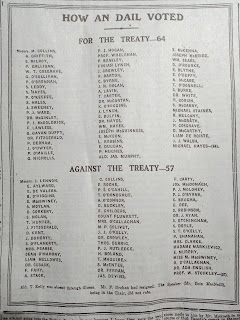7 January 1922: The Treaty was passed by members of Dáil Éireann assembled at Earlsfort Terrace, Dublin [above] on a vote of 64 in favour and 57 against. President De Valera, after the vote was taken, indicated his intention of resigning his position. He said that:
There is one thing I want to say---I want it to go to the country and to the world, and it is this: the Irish people established a Republic. This is simply approval of a certain resolution. The Republic can only be disestablished by the Irish people. Therefore, until such time as the Irish people in regular manner disestablish it, this Republic goes on. Whatever arrangements are made this is the supreme sovereign body in the nation; this is the body to which the nation looks for its supreme Government, and it must remain that---no matter who is the Executive---it must remain that until the Irish people have disestablished it.
Michael Collins, who voted to accept the terms replied that:
I ask your permission to make a statement. I do not regard the passing of this thing as being any kind of triumph over the other side. I will do my best in the future, as I have done in the past, for the nation. What I have to say now is, whether there is something contentious about the Republic---about the Government in being---or not, that we should unite on this: that we will all do our best to preserve the public safety.
The Treaty negotiations had begun in London on 11 October 1921 and concluded in the early morning of 6 December 1921 with the signature, by British and Irish negotiators, of ‘Articles of Agreement’ – better known as the Anglo-Irish Treaty (or the Treaty). This led directly to the establishment of the Irish Free State on 6 December 1922, governing twenty-six of Ireland’s thirty-two counties. It was a milestone in the histories of Ireland, the United Kingdom (UK), and the British Empire and Commonwealth.
But it’s signing caused a huge rift at home as people divided on whether to accept it or not. An Dáil Éireann [Irish Parliament] debated the issue from 15 December on with cogent arguments being made for and against. They broke for Christmas & the New Year and resumed their deliberations in early January. Finally on the 7th of that month the matter was brought to a head and the TDs in attendance voted for or against on its terms.
The day began at 11.30 a.m. when the Speaker read a motion he had submitted in his own name as another attempt to avert a split, but it had virtually no support and was never put to a vote. In the evening, there were concluding remarks from senior Deputies on both sides. Then at 8.30 p.m. the vote was called with all assembled on tenterhooks as which side would carry the day. In the event the Pro Treaty side won it but by a margin that was narrow enough to not give them a decisive result over such a contentious issue as this one was.
Namely was the Irish State to include all the territory of Ireland and was the State to be a Republic or a Free State as demanded by the British Government? The most problematical issue was an Oath of Fidelity to King George V and his lawful successors to be taken by all TDs who were to take their seats in the new parliament of the State. Without that bone of contention there may well have been no Civil War.


No comments:
Post a Comment